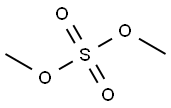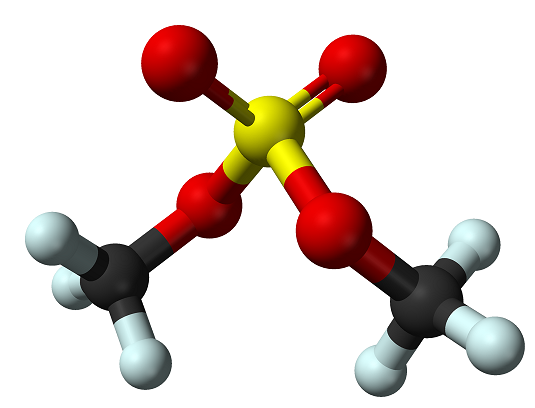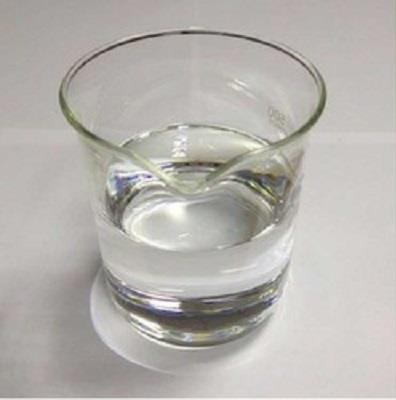Dimethyl sulfate-Hazard and Toxicity
Description
Dimethyl sulfate is an odorless, corrosive, oily liquid which can release toxic fumes during heating. It can be synthesized through the esterification of sulfuric acid with methanol, and alternatively by the distillation of methyl hydrogen sulfate. In industry, dimethyl sulfate is used as a methylating agent for the manufacture of many organic chemicals. It can be used for methylation of phenols, amines, and thiol. Moreover, it can be used for base sequencing and DNA chain cleavage since it can rupture the imidazole rings present in guanine. It can also be used for protein-DNA interaction analysis. However, its vapor is toxic to eyes and lungs, can do harm to our body. It is a potential carcinogen based on known experimental data.
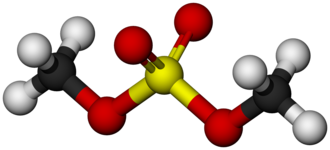
Toxicity Data
LD50 oral (rat) 205 mg/kg
LC50 inhal (rat) 9 ppm(45 mg/m3; 4 h)
PEL (OSHA) 1 ppm(5 mg/m3)—skin
TLV-TWA (ACGIH) 0.1 ppm (0.52 mg/m3)—skin
Hazard
Liquid and vapor can cause severe burns to the skin, eyes, and respiratory tract; corrosive and moderately toxic by ingestion; probable human carcinogen (OSHA "select carcinogen").
Toxicity
Dimethyl sulfate is extremely hazardous because of its lack of warning properties and delayed toxic effects. The vapor of this compound is extremely irritating to the skin, eyes, and respiratory tract, and contact with the liquid can cause very severe burns to the eyes and skin. Ingestion of dimethyl sulfate causes burns to the mouth, throat, and gastrointestinal tract. The effects of overexposure to dimethyl sulfate vapor may be delayed. After a latent period of 10 hours or more, headache and severe pain to the eyes upon exposure to light may occur, followed by cough, tightness of the chest, shortness of breath, difficulty in swallowing and speaking, vomiting, diarrhea, and painful urination. Fatal pulmonary edema may develop. Systemic effects of dimethyl sulfate include damage to the liver and kidneys.
Dimethyl sulfate is listed by IARC in Group 2A ("probable human carcinogen") and is classified as a "select carcinogen" under the criteria of the OSHA Laboratory Standard.
Data indicate that dimethyl sulfate does not specifically harm unborn animals; dimethyl sulfate is not a developmental toxin. It is a strong alkylating agent and does produce genetic damage in animals and in bacterial and mammalian cell cultures.
Reactivity and Incompatibility
Dimethyl sulfate can react violently with ammonium hydroxide, sodium azide, and strong oxidizers.
Storage and Handling
Because of its carcinogenicity, dimethyl sulfate should be handled using the "basic prudent practices" , supplemented by the additional precautions for work with compounds of high chronic toxicity . In particular, work with dimethyl sulfate should be conducted in a fume hood to prevent exposure by inhalation, and appropriate impermeable gloves and safety goggles should be worn at all times to prevent skin and eye contact.
Accidents
In the event of skin contact, immediately wash with soap and water and remove contaminated clothing. In case of eye contact, promptly wash with copious amounts of water for 15 min (lifting upper and lower lids occasionally) and obtain medical attention. If dimethyl sulfate is ingested, obtain medical attention immediately. If inhaled, move the person to fresh air and seek medical attention at once. In the event of a spill, remove all ignition sources, soak up the dimethyl sulfate with a spill pillow or absorbent material, place in an appropriate container, and dispose of properly. Respiratory protection may be necessary in the event of a large spill or release in a confined area.
Disposal
Excess dimethyl sulfate and waste material containing this substance should be placed in a covered metal container, clearly labeled, and handled according to your institution's waste disposal guidelines.
You may like
Related articles And Qustion
See also
Lastest Price from Dimethyl sulfate manufacturers
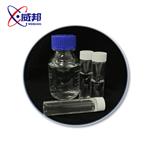
US $10.00/KG2025-04-21
- CAS:
- 77-78-1
- Min. Order:
- 1KG
- Purity:
- 99%
- Supply Ability:
- 10 mt
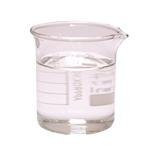
US $0.00/kg2025-03-07
- CAS:
- 77-78-1
- Min. Order:
- 1kg
- Purity:
- 0.99
- Supply Ability:
- 20tons
